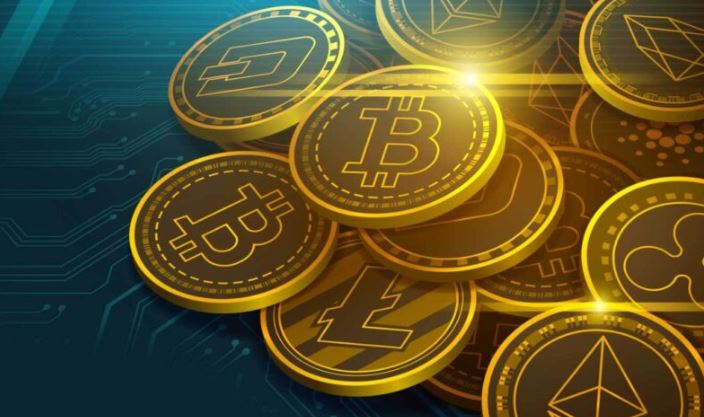Beyond the glitz and glamor of financial speculation, altcoins are quietly reshaping the fabric of industries worldwide. While Bitcoin has captured the public imagination, the diverse ecosystem of altcoins is quietly demonstrating their potential to revolutionize sectors as disparate as healthcare, supply chain management, and governance.

Healthcare: A Prescription for Disruption
The healthcare industry, traditionally mired in data silos and privacy concerns, is ripe for disruption. Altcoins, underpinned by blockchain technology, offer a potential panacea. By creating a decentralized, immutable record of patient data, altcoins can enhance security, privacy, and data accessibility. Imagine a world where medical records follow patients seamlessly, reducing errors, and improving patient outcomes.
Moreover, altcoins can streamline supply chains for pharmaceuticals. From the manufacturing plant to the pharmacy shelf, blockchain can track the movement of drugs, preventing counterfeiting and ensuring quality. This is particularly crucial in regions plagued by counterfeit medications, where lives are at stake.
Supply Chain Transparency: From Farm to Fork (and Beyond)
The journey of a product, from its origin to the consumer, is often shrouded in mystery. Altcoins, however, can illuminate this path. By recording each step of the supply chain on a blockchain, consumers can verify the authenticity, origin, and ethical production of goods. This transparency empowers consumers to make informed choices and holds businesses accountable for their practices.
Consider the food industry. Blockchain can track the provenance of food, from the farm to the grocery store, ensuring food safety, preventing outbreaks, and supporting sustainable agriculture. Similarly, in the luxury goods sector, blockchain can combat counterfeiting, protecting brand reputation and consumer trust.
Democracy Reimagined: Voting with Blockchain
The integrity of elections has been a subject of debate for centuries. Altcoins, through blockchain technology, offer a potential solution. By creating a secure, transparent, and auditable voting system, altcoins can enhance voter confidence and prevent fraud. Blockchain can also facilitate secure online voting, increasing accessibility and voter turnout.
Furthermore, altcoins can empower citizens by enabling direct participation in governance. Through decentralized autonomous organizations (DAOs), communities can collectively make decisions and manage shared resources, fostering a more participatory democracy.
Energy Efficiency and Sustainability: Power to the People
The energy sector is undergoing a profound transformation, driven by the need for sustainability and efficiency. Altcoins can play a pivotal role in this transition by enabling peer-to-peer energy trading, optimizing grid management, and incentivizing renewable energy production. Blockchain can also track energy consumption, identify patterns, and optimize energy usage.
Moreover, altcoins can support the development of sustainable energy projects through tokenization. By representing ownership in renewable energy projects as tokens, altcoins can democratize investment in clean energy, making it accessible to a wider range of investors.
Beyond the Horizon: Uncharted Territories
The applications of altcoins are still in their infancy, with countless possibilities yet to be explored. From intellectual property rights management to identity verification, from financial inclusion to decentralized finance (DeFi), the potential is vast. As the technology matures and regulatory frameworks evolve, we can expect to witness a wave of innovation driven by altcoins.
While challenges such as scalability, regulatory uncertainty, and public perception persist, the transformative potential of altcoins is undeniable. As these digital currencies continue to evolve, they are poised to become the catalysts for a new era of industrial transformation.

FAQs:
Q: Are altcoins risky investments?
A: As with any investment, altcoins carry a certain degree of risk. Their values can be highly volatile, and some projects may not succeed. It’s crucial to thoroughly research and only invest what you can afford to lose.
Q: How do I begin investing in altcoins?
A: Start by educating yourself about various altcoins and their objectives. Select a reliable cryptocurrency exchange to purchase and store your altcoins. Be vigilant about potential scams and phishing attempts.
Q: Can altcoins replace traditional money?
A: It’s uncertain whether altcoins will fully replace traditional currencies. They provide many benefits but also face issues like price instability and regulatory hurdles. It’s more plausible that altcoins will coexist with traditional currencies, offering new opportunities.
Q: What are the benefits of investing in altcoins?
A: Altcoins can offer diversification in your investment portfolio, potentially higher returns, and the opportunity to support innovative blockchain projects. They often aim to improve upon Bitcoin’s technology with enhanced features and use cases.
Q: How can I keep my altcoins secure?
A: To protect your altcoins, use a reputable wallet, enable two-factor authentication, and regularly update your software. Consider using hardware wallets for extra security and avoid sharing your private keys.


